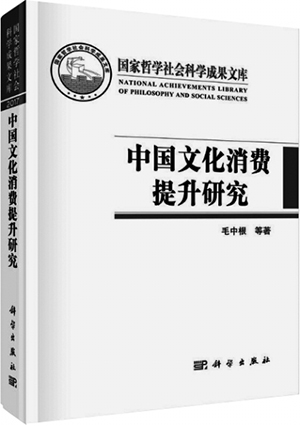A deep investigation into China’s cultural consumption in the new era

Studies on the advancement of China’s Cultural Consumption
Author: Mao Zhonggen
Publisher: Science Press
The report delivered at the 19th CPC National Congress states that “To meet the people’s new aspirations for a better life, we must provide them with rich intellectual nourishment.” Addressing the principal contradiction facing Chinese society in the new era, we must improve and advance China’s cultural consumption. In this sense, the development of the theory of cultural consumption with Chinese characteristics meets the urgent demands for solving the practical issues in China today.
The book by Mao Zhonggen, a professor of economics at the Southwestern University of Finance and Economics, meets this need. This book defines the connotations associated with the advancement of China’s cultural consumption by drawing lessons from the experiences of developed countries on the basis of the practical situation of China’s cultural consumption. It analyzes how China’s cultural consumption interacts with policies as well as the roads toward advancing China’s cultural consumption in the new era.
More specifically, the book shows the following attributes. Previously, Chinese scholars generally studied cultural consumption from the perspective of cultural studies or sociology. This book, however, is written from the perspective of economics, focusing on the advancement of cultural consumption in the context of upgrading the general consumption of the people. Studying the advancement of cultural consumption from the economic perspective is favorable to clarify the relationship between governments and the market and inject more vitality when advancing the culture of China.
The author establishes a theoretical framework combining three indexes—quantity, quality and satisfaction degree of cultural consumption. It elaborates with full and accurate data the contents of these three indexes as well as their logical connections. In terms of the quality of cultural consumption, the author concludes that the permanent income, the degree of education of the household, the level of social security and the level of agglomeration of the cultural industry are in positive correlation with the increase in quantity of cultural consumption.
In terms of quality, it proposes that the advancement of cultural consumption requires joint efforts from the consumer, cultural company, government and the market. It also indicates that the satisfaction degree of cultural consumption, on the one hand, is directly related to the regional level of economic development and resident’s income. On the other hand, it is related to the residents’ experience of cultural consumption. It is noteworthy that the time which residents can spend on cultural consumption as well as the flexibility of their time in consumption play an important role in determining the degree of their satisfaction.
How policies can produce effects in advancing of cultural consumption is of practical value. Professor Mao’s book aims to provide advice and theoretical support to policy-making in cultural domains. He elaborates on how the fiscal, industrial, regulation, trade and human resource policies affect cultural consumption in China.
(edited by CHEN ALONG)

 PRINT
PRINT CLOSE
CLOSE